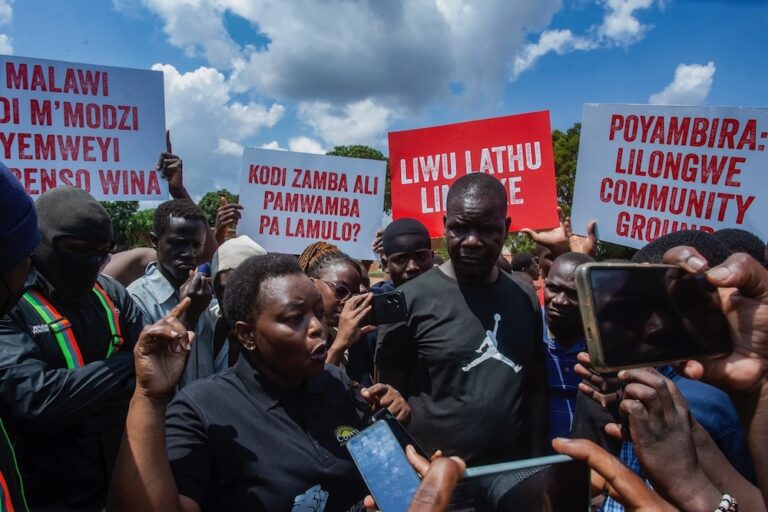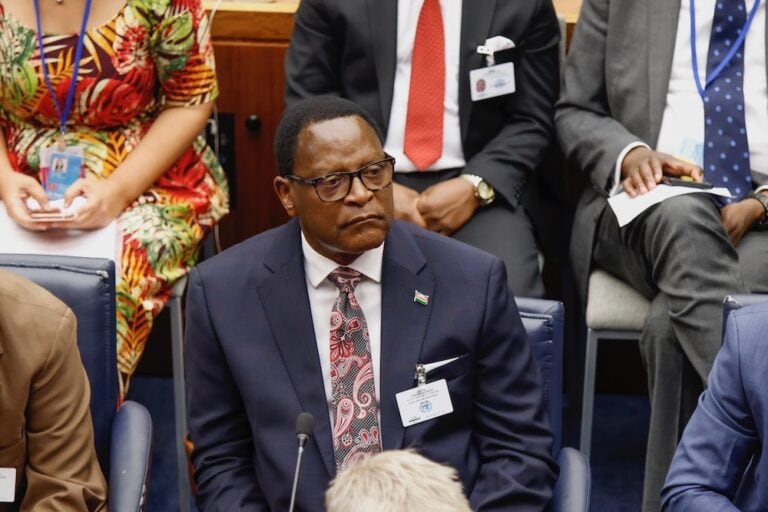(IPI/IFEX) – In a 22 May 2001 letter to Malawian President Bakili Muluzi, IPI expressed its continued concern over the plight of the independent weekly “The Chronicle”; in particular, the number of outstanding civil defamation suits that the newspaper is facing, which IPI fears are being used to consume the newspaper’s finances. According to the […]
(IPI/IFEX) – In a 22 May 2001 letter to Malawian President Bakili Muluzi, IPI expressed its continued concern over the plight of the independent weekly “The Chronicle”; in particular, the number of outstanding civil defamation suits that the newspaper is facing, which IPI fears are being used to consume the newspaper’s finances.
According to the information supplied to IPI, “The Chronicle” newspaper is facing three actions for civil defamation with the threat of another civil suit having been withdrawn. These actions have been brought by a number of plaintiffs; namely, President Muluzi, in his personal capacity; the minister for health and vice-president of the United Democratic Front (UDF), Aleke Kadonaphani Banda; and speaker of the National Assembly and a UDF member of parliament, Sam Mpasu. A fourth civil suit, threatened against the newspaper by Justice R. Chinangwa of the High Court of Malawi in Lilongwe, appears not to have been pursued. All three civil actions were instituted between the start of October and the end of December 2000.
Regarding the statement of claim in each writ, President Muluzi’s action relates to articles in “The Chronicle”, on 18 September and 2 October, stating that he had organised a scheme to award building contracts to supporters in return for donations. The claim made by Banda concerns an article appearing in the 2 October edition of the newspaper under the headline, “Muluzi Urged to Dissolve Cabinet”. Finally, the action brought by Mpasu has its origins in a 4 December article titled “Mpasu: Our Partisan Speaker”, which claimed that the speaker was partisan in his handling of matters on the floor of the house.
Although no dates have been set for hearings in any of the above legal actions, IPI believes that these civil suits represent the culmination of a number of deliberate acts of intimidation against “The Chronicle”; intimidating acts that appear to have their origins in “The Chronicle” editor’s involvement in the dissemination of a damming report by Article 19 last year on the June 1999 parliamentary elections. The report unearthed a disinformation programme, carried out by groups close to the ruling UDF party and designed to undermine the opposition during the elections.
As an apparent result of “The Chronicle”‘s involvement in the publicising of this report, editor Robert Jamieson received a number of thinly veiled death threats; the newspaper’s offices were visited by a group looking for journalist Don Kulapani; Jamieson’s wife, photographer Pushpa Jamieson, was threatened by police; journalists outside the newspaper’s offices were beaten by the mobile police force; there was an attempt to buy-up an edition of the newspaper in Lilongwe by a company and a vendor working for “The Chronicle” was beaten unconscious by supporters of the UDF.
In the opinion of IPI, these lawsuits, when viewed together with the acts of intimidation against the newspaper, constitute a further attempt to intimidate the newspaper and inhibit its abilities to report on events in Malawi. Indeed, the filing of damage claims for civil defamation would appear to be a direct economic threat through which the newspaper’s finances are exhausted in its efforts to vigorously defend itself against the claims made in the writs, thereby forcing the newspaper into insolvency.
Recommended Action
Send appeals to the president:
– reminding him that the role of a politician within a democracy is such that close scrutiny by the media of everything said or done is an inevitable feature of political life. Therefore, politicians must develop resilience to criticism, even where such criticism is felt to be unjustified
– recalling that political discourse is founded on the communication of views and values and, as a consequence, politicians have ample opportunity, via press briefings, speeches, articles and interviews, to ensure that their own version of the story reaches the public
– noting that a reliance on the courts to protect a politician’s reputation is an abnegation of the political process and a fatal misunderstanding of the way in which a modern democracy works
– calling on all plaintiffs in the suits against “The Chronicle” to withdraw their legal actions and to ensure that freedom of the press and freedom of expression are promoted by politicians from all parties in Malawi
– noting that, by doing so, he will be upholding the rights enshrined in the Malawian Constitution under Chapter 4, section 36 which states, “The press shall have the right to report and publish freely, within Malawi and abroad, and to be accorded the fullest possible facilities to access to public information”
– further noting that Chapter 4, section 35 of the aforementioned constitution states, “Every person shall have the right to freedom of expression”
Appeals To
APPEALS TO:Dr. Bakili Muluzi
President of Malawi
Office of the President
Private Bag 301
Capital City
Lilongwe 3
Malawi
Fax: + 265-782095Copies sent to the following:
The Right Honourable Peter Fachi MP.
Attorney General
Ministry of Justice and Constitutional Affairs
Private Bag 333
Capital City
Lilongwe 3
Malawi
Fax: + 265 782176The Right Honourable Clement Stambuli MP.
Minister of Information
Ministry of Information
Private Bag 310
Lilongwe 3
Malawi
Fax: + 265 784568The Right Honourable Aleke Kadonaphani Banda
Minister of Health and Population and vice-president
of the United Democratic Front
Ministry of Health and Population
POB 30377
Capital City
Lilongwe 3
Malawi
Fax: + 265 789431The Right Honourable Sam Mpasu MP.
Speaker of the National Assembly
Private Bag B362
Capital City
Lilongwe 3
Malawi
Fax: + 265 784196Please copy appeals to the source if possible.


